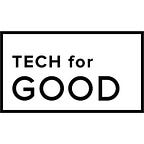Helping the deaf in Poland: the Migam interpreter app
(2015)
By: Cassie Robinson
This is the first in our monthly #TechforGood series that we are doing across Europe, in collaboration with Social Innovation Europe. We are trying to discover and spotlight the ways that people are using and building technology to power social change. Recently, we spoke with Agnieszka Osytek of Migam in Poland.
What is your “tech for good” project or business?
Migam.org is for deaf people and those very hard of hearing. We offer an online interpretation service (through Migam Interpreter App) and have created a sign language dictionary alongside other educational materials. We are also developing a new technology to eliminate communication barriers between the deaf and hearing communities.
Who are your users?
There are 1–2 million hard of hearing people in Poland, 470 000 of them are deaf whose native language is Polish Sign Language which is different from Polish grammar and syntax. Therefore, 70% of the deaf people have limited access to services, offices and cultural life. For effective communication a piece of paper and a pen are not enough. This problem affects around 5 million deaf people in Europe and 72 million worldwide.
How is Migam changing peoples lives?
Migam makes a connection between two worlds — the deaf and the hearing. We mediate between the deaf and hearing staff in institutions. Migam Interpreter App works on smartphone, tablet or through a browser. A deaf user connects with our interpreter and through them is able to communicate with whomever they choose . With our service a deaf person can manage their communications from anywhere.
What are the challenges for the project / business?
At Migam.org we have the ambition to create impact globally and we are trying to raise some more capital to do that: https://investors.migam.org/en
We want to develop the following ideas:
- Software franchise — Each country has its own sign language. Migam.org would like to provide SaaS software licenses for other organisations who work with the deaf to use and make context specific.
- “Uber” for sign language interpreters — Worldwide, there are over 70 million deaf people and only 15 thousand sign language interpreters. To facilitate access to an interpreter we decided to create a portal connecting interpreters and deaf people from all over the world. Now an interpreter from anywhere in the world will be able to register and provide interpreting services remotely and he will receive remuneration for his service. This also means that a deaf person can choose an interpreter based on their style and type of sign language they use.
- KinecTranslator — In 2013 we started working on an automatic sign language translator which creates even more possibility for bridging communication between deaf and hearing communities. KinecTranslator uses motion detection technology based on neural networks. At the moment we use the Kinect camera to read sign language. We’ve already received an EU grant of 1.5 million euros to develop this further and you can read more about this project here: http://migam.org/en/kinectranslator-2/
What does “Tech For Good” mean in Poland? Is there a Tech For Good community?
Tech For Good in Poland means responsible business — which is a pretty new idea in Poland. Nowadays, not only NGOs are focused on responsible business. There are two examples of organisations that come to my mind:
- Sieć Sensownego Biznesu (Reasonable Business Network) — this is a community of leaders of change who put as much emphasis on gains that are social, mental, emotional and spiritual, as they do on financial.
- Ashoka Poland — this is an international organisation that finds and brings together leading social entrepreneurs and introduces innovative system solutions for the most pressing social problems. Ashoka has operated in Poland since 1995.
Who are your peers?
Migam is not alone in the “tech for good” movement here in Poland, even though it is still relatively small. Here are a few examples of those we consider fellow travellers, who are using technology for good:
- Telemedi.co — Polish portal for telemedicine
- OddamOdpady.pl — Which means “Give Waste Away” in English
- GeekGirlsCarrots — tech, learn & connect — girls teaching other girls about computer programming
- Social wifi — they make free access to the Internet at public place
- Fundacja TechSoup — TechSoup’s ambition is that every social organization in the world will have a technological background and knowledge to make full use of its potential.
- Harimata — a new, validated behavior test that uses touch-based gameplay to detect the early signs of autism in toddlers as young as two in just one comprehensive assessment. Also Harimata is a technology that recognizes emotions of users based on movement of computer mouse pattern and on typing pattern.
- Koduj dla Polski (Code for Poland) — Code for Poland is an interdisciplinary community seeking technological solutions to social problems.
What about “civic tech” — is that a thing in Poland?
I understand “civic tech” as “smart cities” or government technology in Poland and some examples are:
- Virtualna Warszawa — a navigation system for smartphones. This is a solution for the blind but also for those who are not familiar with the city. It will be a virtual map and travel guide in one and the EU has given more than 50 Million PLN.
- InteligentneMiasta.pl (SmartCities.pl) — digital transformation of urban space. This is a non-profit initiative that aims to promote the concept of the so called “smart cities” among the Polish public sector (especially local governments), companies and among citizens.
